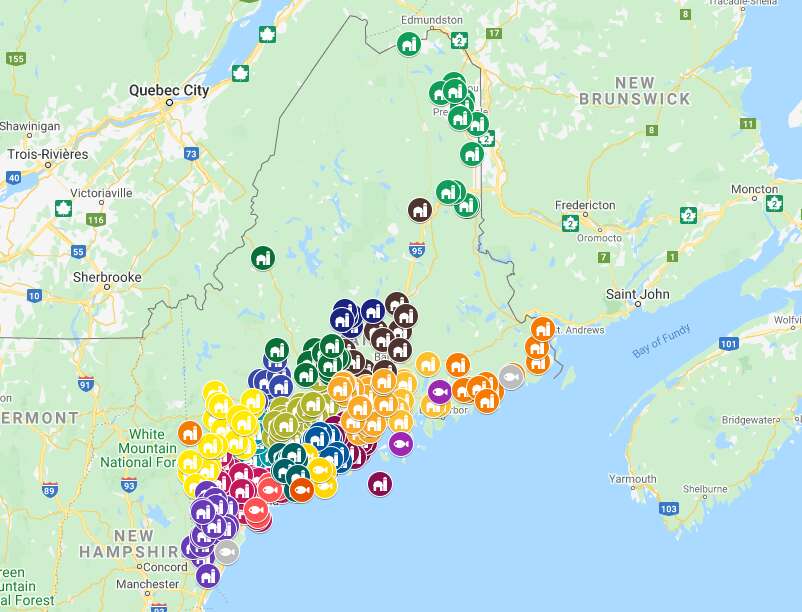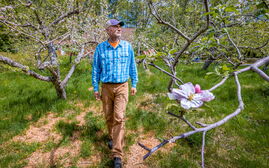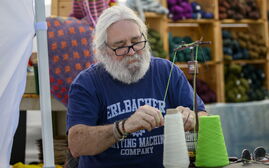
Processing Your Payment
Please do not leave this page until complete. This can take a few moments.
- News
-
Editions
-
- Lists
-
Viewpoints
-
Our Events
-
Event Info
- Women's Leadership Forum 2025
- On the Road with Mainebiz in Bethel
- Health Care Forum 2025
- On The Road with Mainebiz in Greenville
- On The Road with Mainebiz in Waterville
- Small Business Forum 2025
- Outstanding Women in Business Reception 2025
- On The Road with Mainebiz in Bath
- 60 Ideas in 60 Minutes Portland 2025
- 40 Under 40 Awards Reception 2025
- On The Road with Mainebiz in Lewiston / Auburn
- 60 Ideas in 60 Minutes Bangor 2025
Award Honorees
- 2025 Business Leaders of the Year
- 2024 Women to Watch Honorees
- 2024 Business Leaders of the Year
- 2023 NextUp: 40 Under 40 Honorees
- 2023 Women to Watch Honorees
- 2023 Business Leaders of the Year
- 2022 NextUp: 40 Under 40 Honorees
- 2022 Women to Watch Honorees
- 2022 Business Leaders of the Year
-
-
Calendar
-
Biz Marketplace
- News
-
Editions
View Digital Editions
Biweekly Issues
- April 21, 2025 Edition
- April 7, 2025
- March 24, 2025
- March 10, 2025
- Feb. 24, 2025
- Feb. 10, 2025
- + More
Special Editions
- Lists
- Viewpoints
-
Our Events
Event Info
- View all Events
- Women's Leadership Forum 2025
- On the Road with Mainebiz in Bethel
- Health Care Forum 2025
- On The Road with Mainebiz in Greenville
- On The Road with Mainebiz in Waterville
- + More
Award Honorees
- 2025 Business Leaders of the Year
- 2024 Women to Watch Honorees
- 2024 Business Leaders of the Year
- 2023 NextUp: 40 Under 40 Honorees
- 2023 Women to Watch Honorees
- 2023 Business Leaders of the Year
- + More
- 2022 NextUp: 40 Under 40 Honorees
- 2022 Women to Watch Honorees
- 2022 Business Leaders of the Year
- Nomination Forms
- Calendar
- Biz Marketplace
Farmer, consumer resources sprout as season begins amidst COVID-19
 Photo / Maureen Milliken
Farm stands, like this one in Belgrade, farmers markets and CSAs are considered essential businesses and can stay open during the COVID-19 crisis. The state government and organizations across the state are providing resources for both industry businesses and consumers as Maine's growing season begins.
Photo / Maureen Milliken
Farm stands, like this one in Belgrade, farmers markets and CSAs are considered essential businesses and can stay open during the COVID-19 crisis. The state government and organizations across the state are providing resources for both industry businesses and consumers as Maine's growing season begins.
More Information
As the state's farmers begin the growing season, a variety of resources for the agriculture and food-producing industry have sprung up to help businesses and consumers navigate the COVID-19 crisis.
The Maine Department of Agriculture, Conservation and Forestry, the University of Maine Cooperative Extension Service, the Maine Organic Gardeners and Farmers Association and the Maine Federation of Farmers' Markets all offer a variety of resources and information for the industry.
Gov. Janet Mills last week ordered all nonessential businesses to close physical locations that deal with the public or vendors. Essential businesses can stay open, with attention to public safety. They include most agriculture businesses related to farming include food processing, grocery, veterinary clinics and animal feed and supply stores.
Maine has more than 8,000 working farms, with $3.8 billion in sales and 24,000 jobs, according to the most recent U.S. Department of Agriculture figures. The state had more than 130 summer farmers markets last year, and 30 winter markets, according to the Maine Federation of Farmers' Markets.
Portland entrepreneur David Stone, founder of Forager, which connects farmers to local markets, has mobilized to work with various parties, including government agriculture officials, Maine Organic Farmers and Gardeners Association (MOFGA) and the private sector, including major buyers like Hannaford.
“During the last 10 days I’ve been on multiple calls with farms and local food suppliers across the state — 75, in-fact — hosted by Forager. Many have seen their business evaporate overnight. Forager has been developing a cross industry sector/government initiative to try and make sure our farms stay in business,” Stone told Mainebiz.
“The last thing we want farms to do is stop planting and producing, as we may see disruptions in the fresh conventional food supply chain. And of course these farms and artisanal dairy and grocery suppliers are vital to our economy and community," he added.
Some of the resources that have sprouted in the past couple of weeks related to agriculture and keeping business going during the COVID-19 pandemic include:
DACF resources
Maine Department of Agriculture, Conservation and Forestry is urging those involved in agriculture and food-producing businesses to check the COVID-19 page on its website frequently for updates. The page includes a link to a guide with a lengthy list of what types of businesses and functions are included as essential.
"We are in contact with producers and agricultural organizations across Maine in order to minimize the negative impact on growers and address your concerns and issues," the DACF says on its website.
The department, in order to keep producers, businesses and service providers as up-to-date as possible on health and safety issues, is also maintaining the most recent information and guidance from the Maine Center for Disease Control and Prevention and from federal and state partners. The page is updated frequently, the department says.

Farm product, pickup directory
The Cooperative Extension Service has created a Maine farm product and pick-up directory that provides information on available local farm products and alternative pickup options, developed by farmers statewide.
The extension service worked with Allison Lakin, owner of East Forty Farm and Dairy and Lakin's Gorges Cheese in Waldoboro, to develop the database of Maine farmers' creative distribution strategies implemented for the public.
The directory, which includes an interactive map and other resources, lists farms across the state, from the Aroostook Beef Co. in Fort Kent to Andy's Edible Gardens in Eliot.
Farm stands, farmers markets, CSAs
Farmers markets, farm stands and consumer supported agriculture programs are all considered essential services. The markets are considered "critical food sources for many Mainers, including those living in rural areas and those using federal food benefits," the DACF says on its website.
The department has strongly urged the businesses that have contact with the public or more than one employee take steps to ensure social distancing and health and safety measures.
The department has a resource guide on its site for farm stands, farmers markets and CSA programs with a list of recommendations, including things like vendor booth spacing and plan site layout, not having music performances or demonstrations, order-ahead options and more.
The Maine Federation of Farmers' Markets also has a list of winter markets and measures they are taking, as well as links to other resources.
Forager forum
Forager, the digital tool that connects producers to the market, is hosting virtual roundtable discussions and connecting critical voices in local food, to share resources, support one another and to ensure that consumers have access to fresh, local food.
It also has an online forum to connect the food community.
Volunteer help for dairy farmers
A clearinghouse of help for the state's dairy farmers, where volunteers can sign up to help with routine chores, has been created by the extension service and the Maine Organic Farmers and Gardeners Association.
Dairy farms "are not able to simply stop operations," said a news release about the program. "Dairy cows need to be fed and milked daily, and there are multiple other essential tasks. While many farmers in Maine have additional labor, others rely on themselves or immediate family members to continue to function.
The UMaine Extension Waldo County office is compiling a list of available people with some experience on dairy farms, especially milkers. Names and contact information will then be shared with those dairy farmers requesting assistance.
Daily connection for farmers
The extension service is also offering Daily Maine Farmer online connection sessions, from 10-11 a.m. weekdays, for those in the industry to share information.
The sessions began March 23 as a way for farmers and farm service providers to share what is happening on their farms and to engage with experts. Sessions are scheduled until April 6, with further sessions considered if needed.
In addition to farmers, representatives from the DACF, Maine USDA Farm Service Agency and Maine Department of Labor are taking part to discuss programs available for farmers and to answer farmers' questions.
Agriculture resources
Some of the statewide resources for the agriculture and food-producing industry as well as consumers seeking guidance on where to buy, and what's available include:
DACF
The Maine Department of Agriculture, Conservation and Forestry as a page dedicated to COVID-19 concerns, including specific guidelines for agriculture and food producing in general, and specifically horticulture; farmers markets, farm stands and CSAs; animal care; pesticides and more.
It also lists, in detail, what is considered an essential service.
The page is frequently updated and can be found at maine.gov/dacf/covid-19.
Daily Maine Farm sessions
Instructions for joining the sessions, a list of scheduled guests, and notes from previous Zoom sessions are online at extension.umaine.edu. For more information and to receive reminders about the program, email Donna Coffin at donna.coffin@maine.edu.
Dairy volunteers
For information on how to participate in the extension service dairy farm volunteer program, call 207-342-5971.
Farmers markets, farm stands, CSAs
Besides the information provided on the DACF site, the Maine Federation of Farmers' Markets also has updated information at mainefarmersmarkets.org.
Forager forum
Forager, the digital tool that connects producers to the market, is hosting virtual roundtable discussions and connecting critical voices in local food, to share resources, support one another and to ensure that consumers have access to fresh, local food.
It also has an online forum to connect the food community, as well as provides links to resources for both consumers and producers.
MOFGA
The Maine Organic Gardeners and Growers Association has a list of COVID-19 related resources on its website, mofga.org.
Product and pickup directory
The farm product and pick-up directory, which includes a county-by-county listing of participating farms and interactive map, can be found at extension.umaine.edu. For information or to have a farm added to the list, contact Rebecca Gray at rebecca.gray@maine.edu or 207-781-6099.














0 Comments